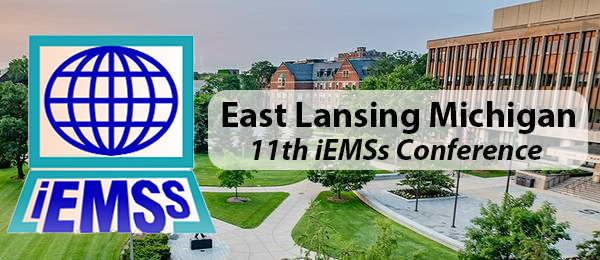Keywords
Crop model; Global sensitivity analysis; Morris' sensitivity method; Sobol' sensitivity method
Start Date
5-7-2022 12:00 PM
End Date
8-7-2022 9:59 AM
Abstract
ARMOSA is a process-based model that has been developed to quantify the effects of crop management practices on soil nitrogen and carbon cycles, groundwater nitrate pollution, and therefore also on soil carbon sequestration. The model reproduces crop growth and development by including soil water dynamics, carbon and nitrogen cycling and evapotranspiration. To identify the most important factors that affect the variability of the annual yield and of the average annual nitrogen leaching at 1 meter soil depth, a global sensitivity analysis of the model is carried out. The analysis is performed on four soil profiles belonging to the region of Marchfeld (Austria) representing the larger soil units in the area. For all profiles the meteorological data are the same accounting for the low spatial variability of the climatic conditions in this region, and the land use considered is wheat. Among the many parameters of the model, our analysis focuses on seventy parameters related to the output variables of our interest. First, the screening method of Morris, with the improvement proposed by Campolongo et al. (2007), is adopted to obtain a first qualitative ranking of the parameters without extensive computations. Then, the more accurate Sobol' method is applied to most contributing inputs only. Our analysis highlights that - despite some minor differences among the soils - crop grain yield is most sensitive to the threshold characterizing the critical nitrogen concentration from emergence to flowering for the aboveground partition of the plant and the carbon dioxide potential assimilation rate, followed by the water stress response parameter and the maximum depth of roots. Nitrogen leaching is most sensitive to the litter carbon efficiency reference coefficient. We further observe that the hydrological properties of the soil profiles have a little impact on the variability of the outputs.
A global sensitivity analysis of the ARMOSA model
ARMOSA is a process-based model that has been developed to quantify the effects of crop management practices on soil nitrogen and carbon cycles, groundwater nitrate pollution, and therefore also on soil carbon sequestration. The model reproduces crop growth and development by including soil water dynamics, carbon and nitrogen cycling and evapotranspiration. To identify the most important factors that affect the variability of the annual yield and of the average annual nitrogen leaching at 1 meter soil depth, a global sensitivity analysis of the model is carried out. The analysis is performed on four soil profiles belonging to the region of Marchfeld (Austria) representing the larger soil units in the area. For all profiles the meteorological data are the same accounting for the low spatial variability of the climatic conditions in this region, and the land use considered is wheat. Among the many parameters of the model, our analysis focuses on seventy parameters related to the output variables of our interest. First, the screening method of Morris, with the improvement proposed by Campolongo et al. (2007), is adopted to obtain a first qualitative ranking of the parameters without extensive computations. Then, the more accurate Sobol' method is applied to most contributing inputs only. Our analysis highlights that - despite some minor differences among the soils - crop grain yield is most sensitive to the threshold characterizing the critical nitrogen concentration from emergence to flowering for the aboveground partition of the plant and the carbon dioxide potential assimilation rate, followed by the water stress response parameter and the maximum depth of roots. Nitrogen leaching is most sensitive to the litter carbon efficiency reference coefficient. We further observe that the hydrological properties of the soil profiles have a little impact on the variability of the outputs.



Stream and Session
false